Understanding Hypoechoic Thyroid Nodules

Today we're diving deep into a topic of critical importance – hypoechoic thyroid nodules. If you or someone you know has recently received this diagnosis, it's essential to understand that hypoechoic thyroid nodules are more likely to be cancerous, making their removal through surgery the preferred treatment option. In this blog post, we will explore what hypoechoic thyroid nodules are, how they are diagnosed, and why expert thyroid surgery is often the best course of action.
Hypoechoic Thyroid Nodules: Diagnosis, Treatment, and the Importance of Surgery
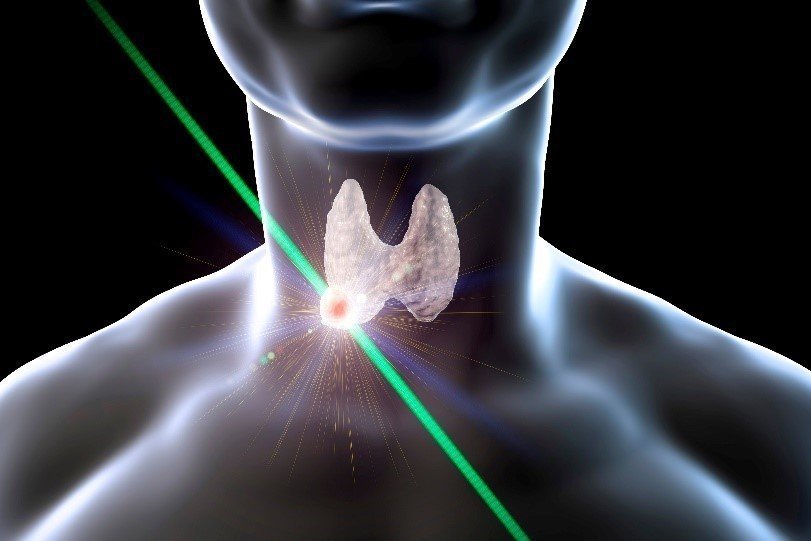
What Are Hypoechoic Thyroid Nodules?
Hypoechoic thyroid nodules are solid growths or tumors within the thyroid gland. Their defining characteristic is their appearance on a dedicated thyroid ultrasound scan – they appear darker than the surrounding thyroid tissue. While not all hypoechoic thyroid nodules are cancerous, they do warrant close attention and evaluation due to their higher propensity for malignancy compared to other types of nodules. Hypoechoic thyroid nodules, whether their consistency/texture is even (homogenous) or uneven (heterogeneous) have a higher risk of cancer than nodules with the same consistency that are not hypoechoic.
Diagnosing Hypoechoic Thyroid Nodules
The characterization and diagnosis of hypoechoic thyroid nodules involves a skilled, high-resolution thyroid ultrasound along with fine-needle aspiration (FNA) biopsy if indicated. Given their heightened risk of malignancy, accurate diagnosis is critical.
- Ultrasound Imaging: Hypoechoic thyroid nodules are most often identified through thyroid ultrasound imaging. A dedicated, high-resolution ultrasound should always be the first imaging test ordered to evaluate the thyroid gland. While some hypoechoic nodules are diagnosed accidentally on CT scan or MRI, an ultrasound should always be done to better assess a hypoechoic thyroid nodule. This imaging method allows healthcare providers to assess the nodule's size, location, and characteristics.
Check out the top 4 things to know about thyroid ultrasounds. - Fine-Needle Aspiration (FNA) Biopsy: When a hypoechoic thyroid nodule raises suspicion, an FNA biopsy may be recommended. During this procedure, a small tissue sample is extracted from the nodule for microscopic evaluation. FNA biopsy can help determine whether the nodule is benign or malignant. Unfortunately, FNA needle biopsy of the thyroid doesn't always work and in up to 30% of cases, the biopsy can be non-diagnostic (no diagnosis can be rendered due to lack of cells in the specimen). On average, about 20% of thyroid nodule biopsies are inadequate for evaluation, although this number should be less than 10% based on consensus recommendations. At the Clayman Thyroid Center, our non-diagnostic biopsy rate is less than 1%. All of this is to say that highly- skilled evaluation of hypoechoic thyroid nodules is crucial.
Read more on FNA needle biopsy.
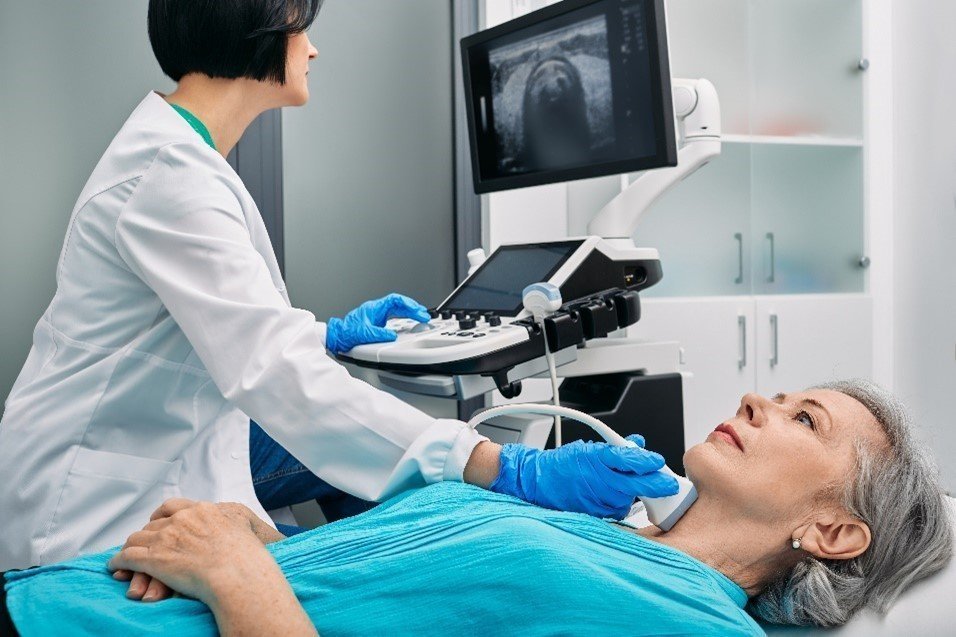
Surgery for Hypoechoic Thyroid Nodules
Thyroid surgery is often the preferred treatment option for hypoechoic thyroid nodules. Here’s why:
- Increased Risk of Malignancy: Hypoechoic thyroid nodules have a notably higher risk of being cancerous compared to other types of thyroid nodules. As such, timely surgical intervention is crucial for proper evaluation and treatment.
- Diagnostic Clarity: Thyroid surgery allows for a comprehensive examination of the nodule and surrounding thyroid tissue. This helps confirm the presence of cancer, assess its extent, and establish a definitive diagnosis.
Learn more about the best ways to diagnose thyroid cancer. - Prevention and Cure: Thyroid surgery offers both prevention and cure. By removing the nodule, the risk of malignant progression (growth and spread of thyroid cancer) is eliminated and the cancer, if present, is cured.
- Preservation of Thyroid Function: Skilled thyroid surgeons, such as those at the Clayman Thyroid Center, aim to preserve as much healthy thyroid tissue as possible during surgery, ensuring minimal to no disruption to thyroid function. Many hypoechoic nodules can be treated and cured by removing just half of the thyroid.
Continue reading about the different types of thyroidectomy.
If you want more on this topic, check out my full article on the top worries concerning thyroid nodules.
Thyroid Surgery for Hypoechoic Thyroid Nodules at the Clayman Thyroid Center
At the Clayman Thyroid Center, we understand the urgency and importance of addressing hypoechoic thyroid nodules promptly and effectively. Our commitment to patient care, combined with our expertise in thyroid surgery, sets us apart.
Our team, led by Dr. Gary Clayman, boasts years of experience in thyroid surgery. In fact, our team performs only thyroid surgery and is the highest volume thyroid surgery group in the country.
It is critical that a highly experienced thyroid surgeon performs the correct thyroid surgery the first time to significantly minimize complications and the need for additional surgeries. Thyroid surgery, and especially surgery for suspicious or cancerous hypoechoic nodules, should only be done by expert thyroid surgeons. By choosing the right thyroid surgeon and the correct thyroid surgery, you can be cured. The wrong choice may lead to repeated surgeries, complications, or worse.
Continue reading about thyroid nodule removal.
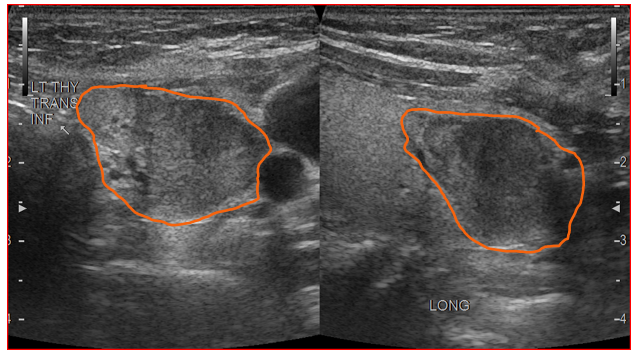
Figure 1: Hypoechoic left thyroid nodule. This was diagnosed as papillary thyroid cancer after surgical removal.
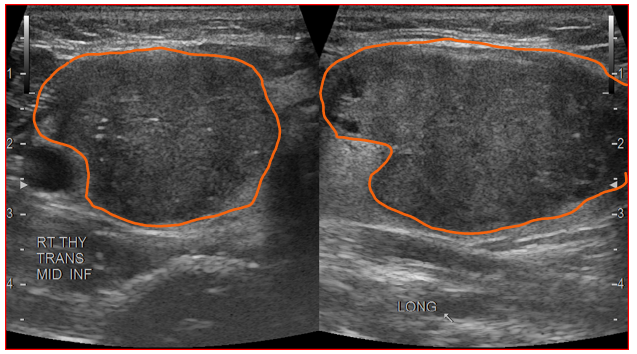
Figure 2: Hypoechoic right nodule diagnosed as medullary thyroid cancer on FNA.
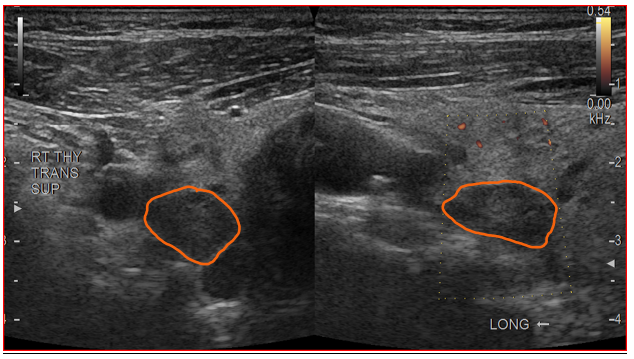
Figure 3: Benign hypoechoic right thyroid nodule.
Hypoechoic Thyroid Nodules: Summary
Hypoechoic thyroid nodules, due to their increased risk of malignancy, necessitate an expert and skilled evaluation, and often require thyroid surgery. At the Clayman Thyroid Center, we are dedicated to providing exceptional care for patients with hypoechoic nodules and other thyroid conditions requiring surgery.
If you or someone you know has been diagnosed with a hypoechoic thyroid nodule, don't hesitate to reach out for an expert evaluation. Early intervention through surgery can be life-saving and offers the best chance for a successful outcome.
If thyroid cancer is suspected, consider reading “I have thyroid cancer, now what?”
Get to know the author, Dr. Nate Walsh, a bit better here.
For more information about thyroid surgery for cancer:
- Visit our website at thyroidcancer.com
- Check out our blog on the three best thyroid operations for thyroid cancer and the top five thyroid cancer symptoms
- Learn more about The Hospital for Endocrine Surgery